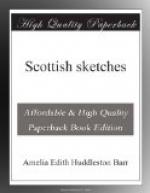“He is a son o’ consolation, and dootless ane o’ God’s chosen,” said Andrew to Mysie on his return.
“He is a far nobler old fellow than he thinks he is,” said John to his wife when he told her of Andrew’s visit.
John had advised advertising for Davie in “The Watchman;” for John really thought this organ of the Methodist creed was the greatest paper in existence, and honestly believed that if Davie was anywhere in the civilized world “The Watchman” would find him out. He was so sure of it that both Mysie and Andrew caught his hopeful tone, and began to tell each other what should be done when Davie came home.
Poor Mysie was now doubly kind to wee Andrew. She accused herself bitterly of “grudging the bit lammie his story-books,” and persuaded her husband to bring back from Keswick for the child the “Pilgrim’s Progress” and “The Young Christian.” John Sugden, too, visited them often, not only staying at Cargill during his regular appointments, but often riding over to take a day’s recreation with the old Cameronian. True, they disputed the whole time. John said very positive things and Andrew very contemptuous ones; but as they each kept their own opinions intact, and were quite sure of their grounds for doing so, no words that were uttered ever slackened the grip of their hands at parting.
One day, as John was on the way to Cargill, he perceived a man sitting among the Druids’ stones. The stranger was a pleasant fellow, and after a few words with the preacher he proposed that they should ride to Sinverness together. John soon got to talking of Andrew and his lost son, and the stranger became greatly interested. He said he should like to go up to Andrew’s and get a description of Davie, adding that he travelled far and wide, and might happen to come across him.
The old man met them at the door.
“My sight fails, John,” he said, “but I’d hae kent your step i’ a thousand. You too are welcome, sir, though I ken you not, and doubly welcome if you bring God’s blessing wi’ you.”
The stranger lifted his hat, and Andrew led the way into the house. John had been expected, for haver bread and potted shrimps were on the table, and he helped himself without ceremony, taking up at the same time their last argument just where he had dropped it at the gate of the lower croft. But it had a singular interruption. The sheep-dogs who had been quietly sleeping under the settle began to be strangely uneasy. Keeper could scarcely be kept down, even by Andrew’s command, and Sandy bounded towards the stranger with low, rapid barks that made John lose the sense of the argument in a new thought. But before he could frame it into words Mysie came in.
“See here, John,” she cried, and then she stopped and looked with wide-open eyes at the man coming towards her. With one long, thrilling cry she threw herself into his arms.
“Mother! mother! darling mother, forgive me!”




